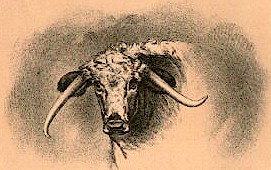The magnitude of
destruction and terror that raged through Cedar County during the Civil
War is unimaginable. Virtually all agriculture in the county was
destroyed.
The following letter, which illustrates this devastation, was
written by James B. Crawford (Jr.) to his uncle, Moses Robbins (II) his mother’s brother in August of 1863 approximately six
weeks before he died. It
was originally transcribed by a Robbins Family researcher in Indiana. This letter is printed here with permission of Kay
Griffin Snow.
Dear
Uncle,
I take the present opportunity of writing you a few lines to let you know that we are all well at present and in a land of rebellion and almost a desolation. Shooting and killing of men is a daily occurence. Stealing of horses and robing of houses and burning of houses is a common everyday thing. You may think you have trouble on account of the war but Morghans Rade is not a drop in the bucket. If you had the Price's Army to pass through your country as often as we have, you might think trouble. Besides we have the guerillas and bushwhackers passing through day and night, robing and burning and killing in every direction. I have hid in the brush and slept in the brush many a night to escape their vengence. I belong to the State Militia. The secesh Bushwhackers has stole all the horses we all had. Mother tried to keep them from taking a horse that she rode-one of them struck her in the breast with his fist and nocked her loos from the horse, which laid her up for two weeks. I have all my cloths taken and nearly all of the bedcloths we had; and all the Union familys is no better off. I have been on lots of scouts after them; I have heard the cannon roar in two battels--it is awful to be in hering of a battle and contemplate upon the vengence and dying grons and shrieks of the wounded. I was in the yard of Stockton post when the notorious Livingston made his charge on the place with 250 men, painted as Indians, and I and many others was cut off from the post; him and three of his men lost their lives and the others wounded; I have passed through many dangers yet am spared. I have been a Union man, and not copperhead, from the start. The secesh tried to drive me out of the country, but I am ready to drive bullets in them. Our American Liberty cost too much blood for me to give it up to seceshionism. It looks like hard times and troble when the women and children has to do all the work indoors and out. Eliza and Sarah and my wife has had to do nearly all the work for 12 months. Mother is tolerable and she can do a heap of work yet and has her health tolerable good yet. I would have wrote long ago but times has been so hard hear since the war came up that I ain't had money enough to mail a letter until I sold a yoke of steers a few days ago. Crops in this country this season is good where there is any - hundreds of farms is vacuated. If you would send your renters to this country, they could rent houses and farms to cultivate and pay no rent for a while. That would be a great help to make peace in Mo. and make it a free state. Tell the boys to stand fast to our American Liberties and not fall off into factions that will ruin the hole cause. Goods is high - calico is from 20 cts. to 50 cts. per yard, domestics from 35 cts. to 50 cts. per yard. Groceries - salt from $7.00 to $10.00 per sack, 2 1/2 pounds of coffee to the dollar, cattel and hogs is about all the stock a man can keep in this country. Nothing more of importance, but remains yours.
(Signed) James B. Crawford
For more letters of this kind or for more information about
Cedar County
As is apparent in this letter, Cedar County was
greatly crippled by the war, and this damage included the county’s
agriculture. Some
historians say that by the end of the Civil War the whole county was
burned. However, just a
few years after the war, the citizens had managed to get the county’s
agriculture production rolling again.
The 1868 Cedar County Agriculture Report stated that wheat
was averaging 15 to 20 bushels per acre, and that some men had bought
farms and had managed to pay them off with two wheat crops. Corn was said to be the “backbone” crop of the area due
to its high yields and sureness of crop.
Whoever wrote the Cedar County Agriculture Report in 1868
claimed that Cedar County grew the finest tobacco in the whole United
States of America (with the exception of the most favored regions of
Virginia). There were also
oats grown along with different fruits such as apples, peaches, pears,
cherries, and grapes.

The Report claimed that stock raising was the primary
business of the county, and that is where the farmers of the county
received most of their income. Horses,
mules, cattle, and sheep were all raised in 1868. However, the Report did admit that the area was in need of
the improved breeds of all kinds of stock.
We know that the war greatly devastated Cedar County and all
of Southern and Western Missouri, but with a few years of hard work the
farmers of these areas soon had agricultural production back up to a
respectable level.
- Missouri Yearbook of Agriculture, 1868
- Cedar County GenWeb site